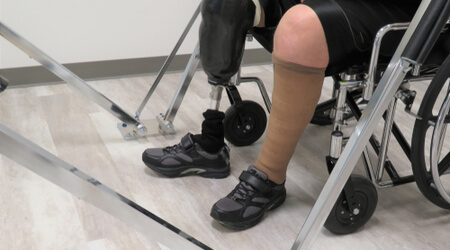
Losing a limb in an accident is a life-changing experience. Many people lead productive lives after the loss of a limb. However, you may be limited in the types of physical work you can perform. You may miss out on the activities you previously enjoyed. If you lost a limb in an accident that was someone else’s fault, you may be entitled to seek compensation for your medical expenses, lost income, diminished quality of life, and more.
At Joye Law Firm, our compassionate South Carolina injury attorneys are ready to help you explore your legal options. Since 1968, our law firm has been focused on helping injured people in South Carolina. We have helped many people who, just like you, have lost a limb in an accident. While we know that no amount of money can make up for your loss of a limb, compensation obtained through an insurance settlement or court award can relieve financial stress, and provide you a measure of justice.
Under South Carolina law, workers who suffer the loss of a limb in a work-related accident may qualify for workers’ compensation benefits.
Contact Joye Law Firm at 888-324-3100 for a free consultation with a Charleston personal injury lawyer with experience handling loss of limb and amputation cases.
What Causes an Amputation/Loss of Limb Injury?
According to the Amputee Coalition of America, the single most common cause of post-traumatic amputations was motor vehicle accidents.
Their researchers found that about 185,000 people suffer an amputation in the United States each year. Roughly 45 percent of these amputations are due to trauma, while 54 percent are caused by vascular disease and nearly 2 percent are due to cancer.
Men are more than twice as likely as women to suffer an amputation. About 12 percent of amputation patients are under 45 years old, while 46 percent are between the ages of 46 and 64, and 36 percent are between the ages of 65 and 84.
A study published in the medical journal The American Surgeon found that 77 percent of post-traumatic amputations were of digits (fingers, toes), while 23 percent were of limbs.
Some of the most common causes of traumatic amputations include:
- Auto accidents
- Motorcycle crashes
- Construction and worksite accidents
- Defective product injuries
- Truck accidents
- Medical malpractice
- Burn injuries
Tragically, many accidents involving the loss of a limb are preventable. Negligence plays a role in many traumatic amputations, whether it is the carelessness of a motorist, truck driver, motorcyclist, business, surgeon, property owner, or someone else. If someone else was at fault for your loss of a limb, you have a legal right to pursue an insurance claim or personal injury lawsuit against the at-fault party.
How Are Amputation/Loss of Limb Injuries Treated?
In the aftermath of a traumatic amputation injury, the goal of a first responder or treating physician is to control bleeding. This can be achieved by directly applying pressure to the open wound.
In some cases, a tourniquet may be required to restrict blood flow to the affected area, though using a tourniquet for an extended period can lead to more harm.
A doctor will treat the injury by removing any damaged tissue, sealing blood vessels, inserting a drain, creating a stump that will accept a prosthetic limb, and closing the wound. Because infections can occur in the affected area, a doctor may also choose to leave the area unsutured for the time being.
As part of the treatment for the loss of a limb, your doctor may recommend rehabilitative care which includes physical therapy, occupational therapy, and mental health care. According to one study, the more time that individuals with amputation injuries spend in inpatient rehabilitation, the more likely they are to be able to function physically.
The Impact of Losing a Limb
Losing a limb can have a profound impact on your life. It may cause emotional anguish and diminish your ability to enjoy everyday activities. For instance, you might not be able to exercise the same way. You might not be able to go on runs or hikes and enjoy the outdoors as you did before. You may have more difficulty accessing places you’re used to visiting. You might have to use a wheelchair, walker, or prosthetic limb. In other words, your mobility could be severely restricted.
You could also experience physical complications after surgery.
Some of the most common complications that victims of traumatic amputation suffer include:
- Gangrene
- Deep vein thrombosis, or DVT
- Shock
- Nerve damage
- Infections
- Phantom pains
- Bleeding
- Pneumonia
If you develop complications after a traumatic amputation, you might have to spend more time in the hospital.
In addition to the physical toll of traumatic amputation, you could suffer psychological and emotional trauma.
Some of the most common psychological complications of amputation include:
- Post-traumatic stress disorder (PTSD) – Many people who suddenly lose a limb subsequently experience PTSD, including panic attacks, nightmares, avoidance behaviors, loss of enjoyment of life, irritability, aggression, and self-destructive behavior. Fortunately, there are many therapists and mental health professionals who are skilled at helping victims of PTSD process their trauma.
- Depression – After losing a limb, you may experience depression, which often manifests itself through symptoms such as feelings of hopelessness persistent sadness, loss of interest in typical activities, lack of interest in intimate relations, fatigue, and poor appetite. While it’s normal to struggle with depression after a serious injury, a mental healthcare specialist can be of help. Having a solid support group, including close friends and family, can help you overcome depression.
- Self-consciousness – The loss of a limb can lead to certain limitations as well as an unwanted change of appearance, both of which may lead to self-consciousness and social discomfort. Advanced prosthetic devices can overcome many of these physical limitations, while a mental health counselor can help you process the changes to your body image.
While suffering the loss of a limb can be physically and emotionally difficult, you do not have to face the challenges alone. An experienced Charleston personal injury lawyer can help you demand the justice and the financial compensation you deserve. No amount of money can make up for the loss you have suffered, but it can pay for the care you need.
Our attorneys have helped people who have lost limbs get the compensation they needed, including a 2.75 million settlement for a man whose leg was amputated after a stairwell collapsed and a $2.3 million settlement for a man who lost an arm due to unguarded industry machinery.
Every case is different and past results are in no way intended to imply a similar result in a future case. But past results do reflect our law firm’s experience handling these types of serious cases and the effort we make to achieve a positive outcome for our clients.
Compensation for Amputation/Loss of Limb Injuries
Depending on the specific losses you suffered as the result of the amputation, you may be entitled to claim compensation for:
- Medical bills – This includes hospital bills, doctor’s visits, surgeries, prescription medications, and emergency services such as ambulance rides.
- Physical and occupational therapy – This covers any form of rehabilitative care you require due to injuries or disability – including physical therapy, occupational therapy, or psychological therapy.
- Personal support and home health care – Some serious injuries may necessitate in-home care. You could seek compensation for home care costs, home and vehicle modifications, medical equipment, and other living costs.
- Lost wages – If you are unable to work while you are recovering from your injuries, you could seek compensation for lost income.
- Scarring and disfigurement – Loss of a limb qualifies as a type of permanent disfigurement for which you can be compensated.
- Diminished quality of life – Individuals who suffer traumatic amputations may face a substantially diminished quality of life for which they can and should be compensated by the at-fault parties.
If you suffered the loss of a limb in a workplace accident, you may be eligible for workers’ compensation benefits including paid medical care and a scheduled disability benefit based on the specific body part that was lost. Most employers in South Carolina are required to carry workers’ compensation insurance to provide paid medical care and other benefits to injured employees. Our attorneys at Joye Law can review the circumstances of your amputation injury and evaluate whether you are eligible for workers’ compensation benefits.
Contact a Charleston Lawyer about Your Loss of Limb
Did you suffer the loss of a limb in an accident that someone else caused? If so, contact a Charleston loss of limb attorney at Joye Law Firm right away. We understand how stressful it can be to live with the burden of medical costs and lost income, particularly when you’ve just endured life-changing trauma that wasn’t your fault.
Our experienced trial lawyers have the resources to conduct an investigation of the accident that caused your injury, collect evidence to establish fault, negotiate with the insurance company, and even take your case to court if necessary. We are committed to helping seriously injured clients seek the maximum possible compensation they need to rebuild their lives. Contact us today for a free, no-risk case evaluation.



























